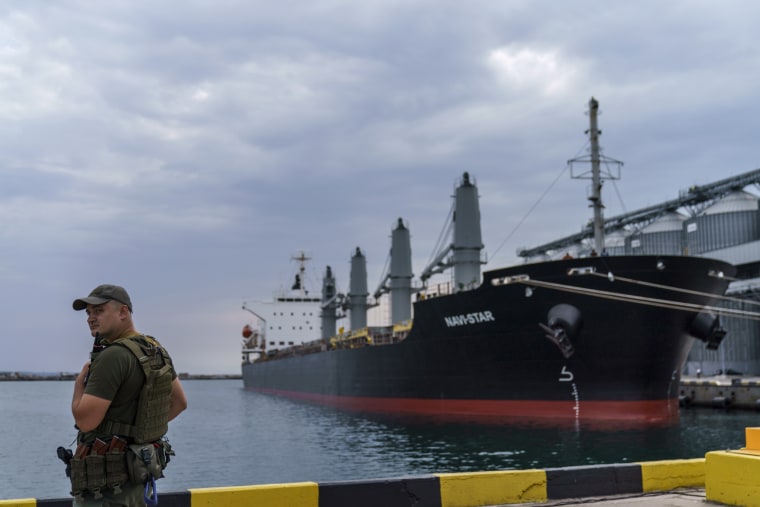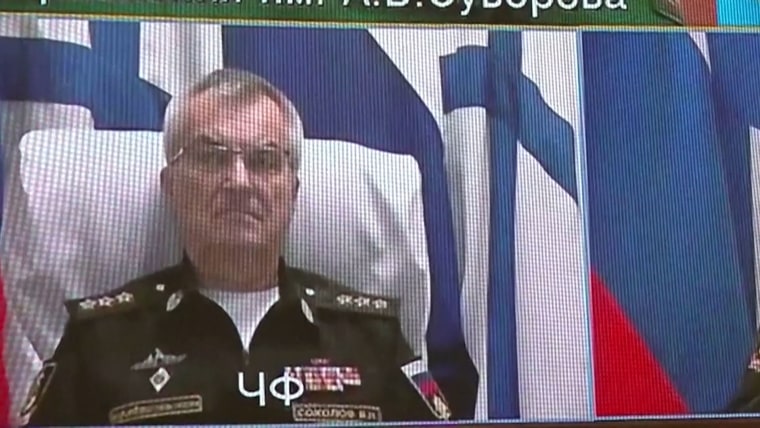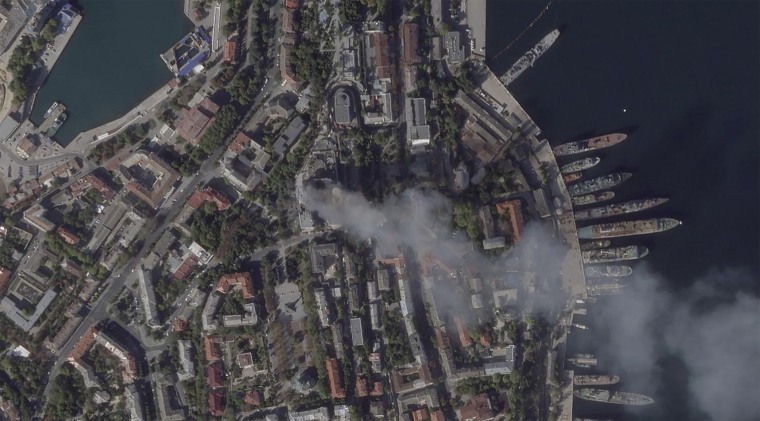KYIV, Ukraine — Britain says it has intelligence that Russia is trying to target civilian cargo ships carrying grain in the Black Sea by laying sea mines and planning to blame any attacks on Ukraine.
The U.K. did not provide any evidence for the allegation, which comes as Ukraine appears to be gaining momentum in the fight over the crucial sea, which is both Kyiv’s main export corridor and a launchpad for Russian attacks.
A senior Ukrainian official said Russia has been laying more mines in the Black Sea because its ships’ commanders fear getting too close to the shore and being struck by Ukrainian missiles.
Ukraine has in recent weeks hit back at Russia’s Black Sea Fleet with a wave of strikes, leading analysts and officials to suggest that the Kremlin may have been forced to pull back some of its ships to safer waters and away from a home it has historically used to project power across Europe and Asia.
While Kyiv’s counteroffensive has yet to achieve a breakthrough on the battlefield, success in the Black Sea could help loosen the Kremlin’s grip on the occupied Crimean Peninsula.
 A security official stands next to the Navi-Star cargo ship ready to export grain from Odesa, Ukraine, on July 29, 2022.David Goldman / AP file
A security official stands next to the Navi-Star cargo ship ready to export grain from Odesa, Ukraine, on July 29, 2022.David Goldman / AP fileAgainst the backdrop of such attacks, the British Foreign Office said in a statement Wednesday that Russia wants to “deter the export of Ukrainian grain” by covertly targeting cargo ships.
“Information declassified today shows Russia may continue to target civilian shipping in the Black Sea, including by laying sea mines in the approach to Ukrainian ports,” it said. “Russia almost certainly wants to avoid openly sinking civilian ships, instead falsely laying blame on Ukraine for any attacks against civilian vessels in the Black Sea.”
Ukraine says it has, indeed, seen Russia laying more mines in the Black Sea, said Andrii Chernyak, a spokesman for Ukraine’s military intelligence agency.
“The Russian warships can’t” get close enough to the Ukrainian coastline, “as they are afraid of being hit by our missiles,” he said. So they have “really put efforts to mine the sea to the maximum, as they still aim to make navigation in the Black Sea impossible.”
Part of the reason the Black Sea is so important is that Kyiv has traditionally used it to export grain and other agricultural products, of which it is one of the world’s top producers and sellers.
Russia abandoned a deal in July that allowed Ukraine to export food products, hiking international food prices and threatening a hunger crisis in some of the poorest parts of the world.
Since then, Ukraine has set up a “humanitarian corridor,” defying the de facto Russian blockade. And it is that corridor that the British Foreign Office says Russia seeks to target.
“The world is watching — and we see right through Russia’s cynical attempts to lay blame on Ukraine for their attacks,” Foreign Secretary James Cleverly said in the statement.
Ukrainian President Volodymyr Zelenskyy was in Spain on Thursday rallying support from European leaders at a summit he said would focus on “joint work for global food security and protection of freedom of navigation” in the Black Sea.
Russia has consistently denied targeting civilians, but it has a well-documented record of carrying out attacks on civilian and nonmilitary infrastructure in Ukraine, as well as in previous conflicts in Syria, Georgia and Chechnya.
The Russian Defense Ministry has not responded to a request for comment about the British allegations.
On Thursday, Russian President Vladimir Putin spoke at the Valdai Discussion Club, an annual keynote foreign policy event, in the Russian city of Sochi, which is also on the Black Sea.
Putin has suffered setbacks in the area after a series of high-profile attacks by Ukraine since August. Kyiv claims to have damaged several ships and a submarine and injured or killed dozens of officers.
The commander of the Russian fleet was, however, shown in video a day after Ukraine claimed he had been killed.

Watch: Russian Black Sea Fleet commander seen in video after Ukraine said it killed him
“Ukraine’s success in the Battle of the Black Sea is all the more remarkable as the country does not currently have a functioning navy,” the Atlantic Council wrote in a briefing Wednesday. “Instead, Ukraine has relied on daring commando raids along with a combination of domestically produced drones and long-range cruise missiles provided by the country’s Western partners.”
Despite the “limited arsenal,” the attacks have “been deployed with the kind of ingenuity that has become the calling card of the Ukrainian military,” it said.
The Wall Street Journal reported Wednesday that the Black Sea Fleet had withdrawn the bulk of its ships from its main base in Sevastopol, in the Ukrainian peninsula of Crimea, which Russia occupied in 2014, to its base in Novorossiysk, a port on the Russian mainland.
Putin’s spokesman, Dmitry Peskov, said Thursday that he could not comment on the report and that it was a matter for the Defense Ministry, which has not responded to a request for comment.
 Satellite images show an attack on the Russian Black Sea Fleet headquarters in Sevastopol, Crimea, on Sept. 22.Planet Labs PBC via AP
Satellite images show an attack on the Russian Black Sea Fleet headquarters in Sevastopol, Crimea, on Sept. 22.Planet Labs PBC via APDmytro Pletenchuk, a Ukrainian naval spokesman, said at a news briefing Wednesday that the ships “try to visit Sevastopol’s port as rarely as possible because they do not feel the same level of security as they are used to in this port.”
But he also suggested the maneuvers were at least partly routine and that Russia tries “to periodically move their ships between their ports.”
Chernyak, the military intelligence spokesman, said Russia was trying to “hide” its ships to stop their being sunk by Ukraine.
Meanwhile, Russia has signed a deal to house a permanent naval base in the breakaway Georgian region of Abkhazia, also on the Black Sea, its leader told local media Thursday.
That would re-establish an old Soviet-era base, and it could suggest an attempt to diversify the number of ports open to the fleet.
Daryna Mayer reported from Kyiv, and Alexander Smith from London.




